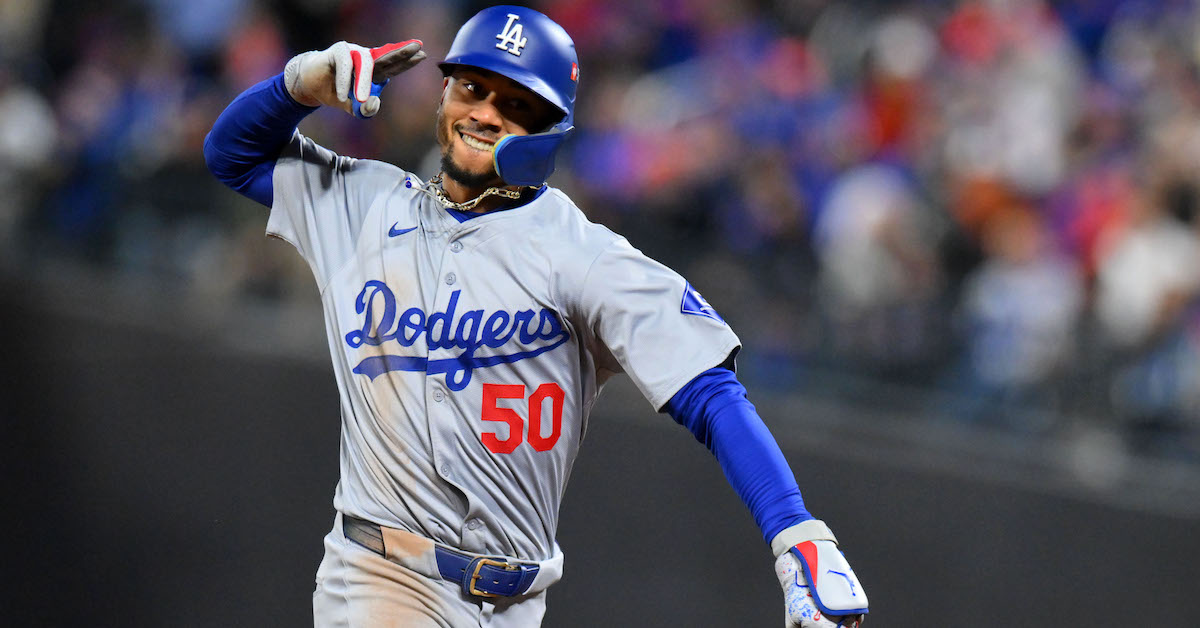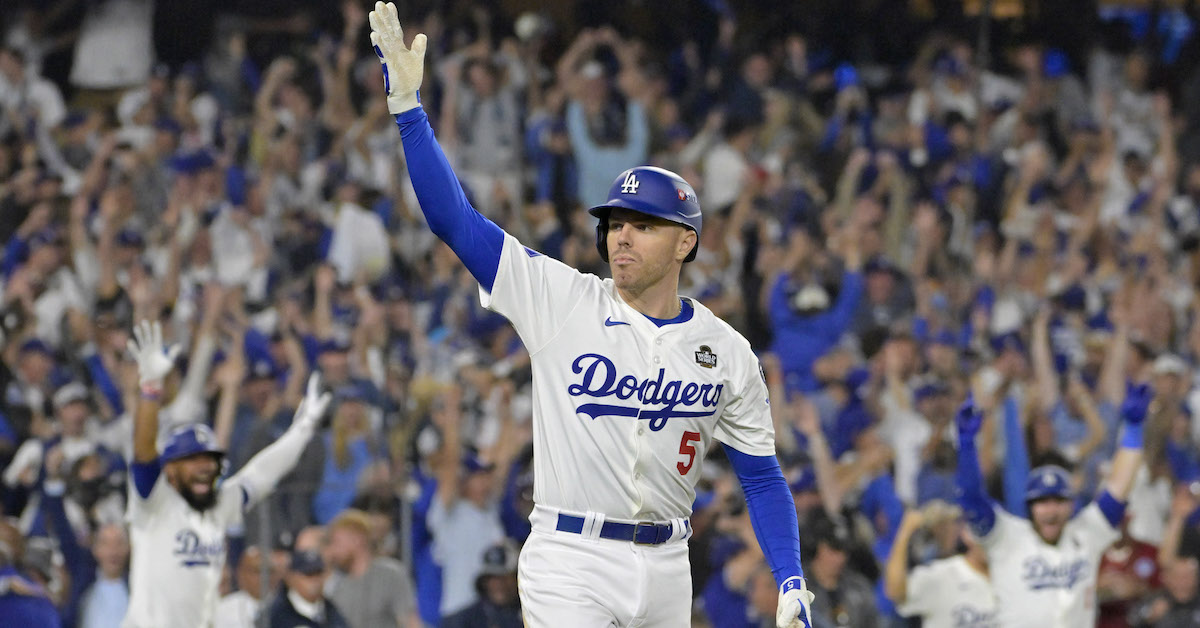[ad_1]
John Jones-Imagn Images
In baseball history, there have been 15 players signed to contracts worth a total of $300 million or more. The Dodgers started three of those 15 players on Thursday night — Shohei Ohtani, Mookie Betts, and Yoshinobu Yamamoto. That’s a ridiculous amount of money, especially for such a trivial enterprise as baseball. When a team — even a team as well-resourced as the Dodgers — spends that much money on a trio of players, it means they really want to win.
Well, the syndicate of investors at Guggenheim Baseball Management got their money’s worth on Thursday. Ohtani homered to lead off the game and added three walks, scoring four runs in total. Betts went 4-for-6 with three runs and a homer of his own, which took the Dodgers’ lead from tenuous to comfortable in the sixth. And Yamamoto struck out eight batters in 4 1/3 innings as the Dodgers won 10-2. The World Series is now just one win away.
The Dodgers opened the scoring on the second pitch of the game, when Jose Quintana served up a meatball to Ohtani. The reigning AL MVP (who clearly read my article about his struggles with the bases empty) produced the second-hardest-hit ball of these playoffs to put Los Angeles up 1-0. For the first few innings, the Mets kept answering, clawing back most of the way, sometimes tying the game, but they never took the lead. And the Dodgers always responded, re-extending the lead whenever the Mets cut it down. The two teams even traded successful challenges on potential double plays.
Eventually, the Mets, like a tiring distance runner, could no longer maintain contact. After putting the go-ahead run on base with one out in the third inning, they never got that close again.
Notwithstanding the occasional 117-mph home run, the Dodgers offense did its damage gradually and methodically, like a triple-option football offense or a boxer with a good chin and a penchant for working the body.
Heading into this start, Quintana had not allowed an earned run in his past three postseason starts, with all of them lasting at least five innings. At this point in his career, Quintana works by playing keep-away, and when hitters follow him outside the strike zone to the dark and foreboding sylvan environs beyond, he gobbles them up. In Quintana’s previous three starts, he allowed just 13 baserunners over 16 1/3 innings, while striking out 14. This, in spite of throwing just 57.5% of his pitches for strikes, and a mere 37.5% in the zone. The Dodgers refused to chase.
In those previous three starts, Quintana produced a chase rate of 27.8%. In Game 4, the Dodgers chased just 13% of the time. In three-ball counts, the Dodgers were basically perfect. Quintana threw 10 pitches in three-ball counts, four outside the zone, all of which were taken for walks. The Dodgers swung at, and made contact with, all six three-ball pitches inside the zone. They fouled off three and put the other three in play. Two of those balls in play went for hits. They were just on Quintana from the get-go.
The veteran lefty faced 19 batters; nine of them reached base and five scored. Mets manager Carlos Mendoza, who’s been anachronistically and deleteriously reluctant to go to his ‘pen early in games, called for José Buttó with two on and one out in the fourth, with the Mets trailing 3-2. Buttó quickly fell behind Betts, who lanced the first strike he saw into left field for a two-run double.
Yamamoto has been inconsistent since his return from a shoulder injury this season, and he hasn’t thrown a pitch in the sixth inning since June. His two NLDS starts were uneven; the Padres knocked him around for five runs over three innings in Game 1, and he struggled with his command in the clincher, but managed to escape without being scored on. In Game 4 in New York, Yamamoto looked more like what was advertised.
He threw 14 sliders, his highest total since coming to the U.S. The Mets swung at 10 of them and didn’t put a single one in play. In total, Yamamoto got eight of his 13 outs by strikeout. He was by no means perfect. The Dodgers ace showed Mark Vientos a middle-middle fastball in the first inning, and the red-hot Mets third baseman did what he’s wont to do with such pitches, and launched it into the right center field seats. That opened the door for a series of punches and counterpunches.
After the Dodgers plated two runs in the top of the third to retake the lead, Yamamoto left hittable pitches in the zone to Francisco Alvarez and Francisco Lindor, who hit back-to-back singles. Then, after striking out Vientos, Yamamoto couldn’t find the zone at all against Pete Alonso, and loaded the bases with one out.
But the Mets could only eke out a single run, and that required a feat of incredible willpower by Brandon Nimmo. The Mets left fielder has been literally hobbled by plantar fasciitis, but he outhustled a relay to first, the connective tissue in his foot no doubt screaming the whole time, in order to turn an inning-ending grounder into an RBI fielder’s choice. Unfortunately, that’s about where New York’s resistance gave out.
Starling Marte grounded out to end that threat, then the Dodgers chased Quintana an inning later and stretched the lead to five on Betts’ home run in the sixth. The Mets had one last stab at a comeback in the bottom of that inning. Dodgers relief ace Evan Phillips had retired the first 15 batters he faced this postseason, but loaded the bases with nobody out to start the sixth. And the Mets, with the opportunity to cut the lead to one with a swing, produced nothing. Jesse Winker’s inning-ending flyout left the bat at 94.4 mph, but never came especially close to leaving the yard. After that, the Dodgers kept pouring it on.
The Mets used three relievers after Quintana — Buttó, Phil Maton, and Danny Young. All three allowed at least three baserunners and at least one run. Max Muncy went 1-for-2 with three walks of his own, and set a new postseason record by reaching base safely in 12 consecutive plate appearances. We know better than to put too much stock in momentum. Especially when the team on the verge of elimination has cheated death as many times as these Mets have. But the Dodgers beat the brakes off their hosts for the second night in a row, and the wasted bases-loaded opportunities in the third and sixth innings look like a capitulation.
The biggest reason for optimism in New York right now is the fact that while Phillips (in Game 4) and Blake Treinen (in Game 3) each pitched a scoreless four-out stint, the Mets put multiple men on base against the Dodgers’ two best relievers and made them sweat. That could be important later on, as reliever overexposure becomes an issue in a best-of-seven series, and the Dodgers line up for a likely bullpen game in Game 6. Unfortunately, over the past two nights, the Mets have not looked capable of forcing a Game 6. The magic that got them this far is running out.
[ad_2]



